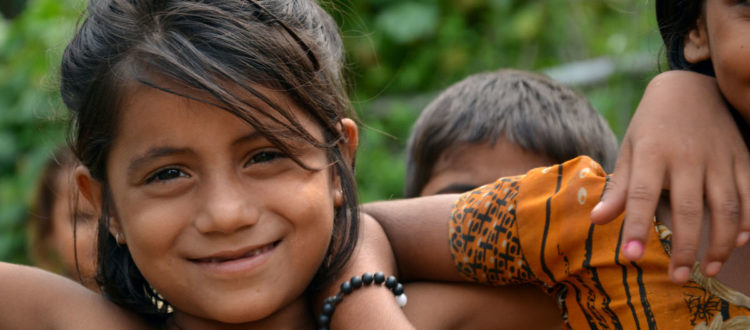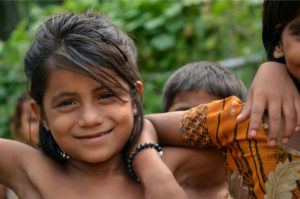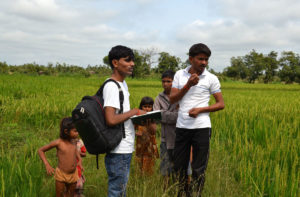Quelques heures à Chuhada
Participatory Project – Chuhada
Water extends as far as my eyes can see. Hundreds of still closed water lilies float on the surface of the water that reflects the sun’s beams. Then, in the distance, a farmer starts shouting some words as he tries to convince his buffalo to enter the water. The stubborn animal does not seem to obey his master’s shouts of encouragement and frustration and it takes him several minutes to finally enter the muddy shore.
This memory resounds in my mind as I look back at the moments spent with the Rain Drop Team in India, and is a perfect illustration of the patience required when it comes to convincing some farmers to adhere Rain Drop’s activities in the region. Indeed, the most difficult part in participatory projects like those of Rain Drop is not to break the rock and make the land fertile but on the contrary convince the local farmers to adhere the projects. In Chuhada, a village situated a few kilometers away from Mao, a small rocky road surrounded by cob houses leads to the only well of the village where children play with smiles on their faces. Poverty and lack of drinking water are real. However, the villagers are always ready to blame nature, the government and the alignment of the stars for the lack of water, the leaks in the pond that neighbor the village and the poor yields of the rice plantations.
“They’re blaming everyone and I started blaming one of them,” said Ashok, a Rain Drop participatory project leader in the region. In spite of the coconut biscuits offered to us, the adhesion of the farmers seems compromised. Nonetheless, as time passes, through discussion, examples, anecdotes and smiles, the dialogue finally begins. Each year, the population increases in Chuhada but the grounds, however, are not extensible. There is only one solution to solve this seemingly irresolvable equation, and that is to increase the output of cultivable lands. Thanks to the contribution and adhesion of the villagers as well as the support of Rain Drop’s team, the corn and rice fields can be transformed into lemon fields for example. These are more profitable and demanding less water, and this strategy shows how cooperation in participatory projects, hard work and new techniques are vital in the transformation of living conditions and creation of a more prosperous environment.
Based on the testimony made by Héloise, RainDrop team France, during a visit to India
De l’eau à perte de vue. Des nénuphars à peine ouverts qui flottent à la surface, et le soleil qui écrase les ombres au sol. Puis des cris au loin : un fermier tente de convaincre son buffle d’entrer dans l’eau. L’animal est têtu, il se dérobe à la dernière minute, obligeant la frêle silhouette à hausser la voix pour l’encourager. Finalement, dans une gerbe d’eau et de boue, le buffle entrera dans l’eau et le fermier continuera à crier, de joie cette fois.
Ce n’est qu’un souvenir d’Inde, instant suspendu au bord d’un étang en compagnie d’Ashok, qui pourtant illustre parfaitement la patience des équipes de Rain Drop pour convaincre certains agriculteurs du bien fondés de nos actions. Car le plus dur dans un projet participatif comme le sont ceux de Rain Drop, ce n’est pas la roche qu’il faut casser pour rendre les terres fertiles, mais parfois l’adhésion des fermiers aux projets. Chuhada, un village à quelques kilomètres de Mao, des maisons de torchis qui serpentent autour d’un petit chemin de pierre. Sourires des enfants autour de l’unique puits du village. Pourtant, les habitants sont prompts à blâmer la nature, le gouvernement et l’alignement des astres pour le manque d’eau, les fuites dans l’étang qui jouxte le village et le faible rendement des plantations de riz.
« They’re blaming everyone and I started blaming one of them » me dit Ashok. En dépit des biscuits à la noix de coco qui nous sont offerts, l’adhésion des fermiers semble compromise. Mais à force de discussion et d’exemple, d’anecdotes et de sourires, le dialogue s’engage enfin. Chaque année, la population augmente à Chuhada, mais les terres, elles, ne sont pas extensibles. Une seule solution pour résoudre cette équation à priori insoluble : augmenter le rendement des espaces cultivables. Grâce à l’appui de Rain Drop et à la contribution des villageois, les champs de riz et de blé peuvent se transformer en champs de citronniers. Plus rentables, moins exigeants en eau. Revitaliser les terres parsemées de roches chauffées à blanc par les rayons du soleil.




